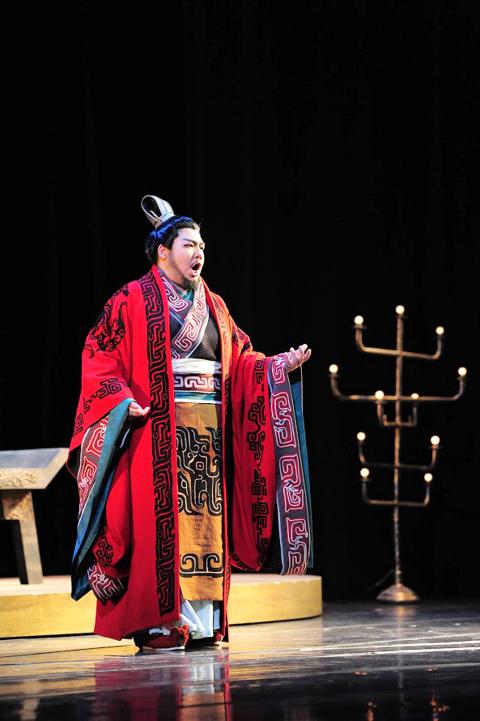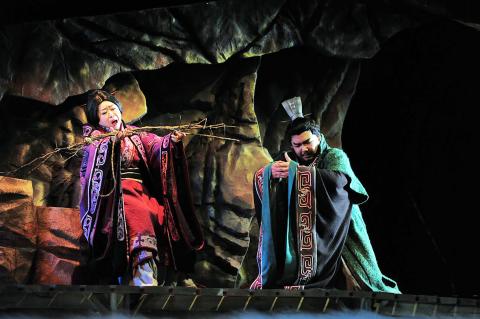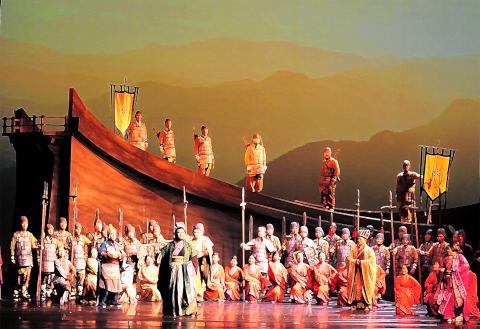Famed opera singer and director Tseng Dau-hsiong (曾道雄) has never been one to shy away from big challenges. His latest effort for the Taipei Opera Theatre (臺北歌劇劇場), a tale of family intrigue and clashing values, inspired by the Commentary of Zhou (左傳), is a coproduction with the National Theater Concert Hall (NTCH) and opens tonight at the National Theater.
A Vow to the Underworld Spring (鄭莊公涉泉會母) is set during the Spring and Autumn period of the Eastern Zhou Dynasty, about 722 to 721BC. It features a scheming mother, rival brothers, a bloody ghost and a tale of redemption — a perfect recipe for opera, be it Western or Chinese.
The 77-year-old Tseng, who was awarded the National Culture and Arts Award in 2011, is considered Taiwan’s “godfather of voice.” Over the course of his almost five-decade long career, he has been an opera singer, conductor, director, playwright, composer, producer and one of the main proponents of Western opera in the nation.

Photo Courtesy of Taipei Opera Theatre
Tseng majored in voice at National Taiwan Normal University and began working as a music teacher in a junior high school in the then-Taipei County before being called up to serve his mandatory military service. A Spanish government scholarship took him to the Madrid Royal Conservatory of Music, where he grew more interested in Western opera, and in 1970 he began studying at the Opera Workshop of the University of California, Los Angeles. He returned to Taiwan two years later and founded the Taipei Opera Theatre in 1973. In the ensuing decades he has directed and produced several operas, including two by Wolfgang Amadeus Mozart that were the first Western operas ever performed in Mandarin in Taiwan.
A Vow to the Underworld Spring is not the first Western opera that Tseng has created based on a Chinese or Taiwanese story. In 1999, he created The Scarecrow and the Thief (稻草人與小偷), which drew on his childhood in Changhua County.
The background to the opera’s plot revolves around A Vow to the Underworld Spring, the story of Wu Sheng (寤生), who grows up to be Duke Zhuang of Zheng (鄭莊公), and his mother, the Lady Wu Jiang (武姜). His was a very difficult and painful birth, which leads his mother to dislike him intensely. She much prefers her second son, Tai Shu-duan (潁考叔), and wants him to succeed her husband. However, after the father’s death Wu Sheng becomes duke. His mother asks him to make his brother the governor of Zheng’s largest city and he does, but mother and younger brother plot a coup.

Photo Courtesy of Taipei Opera Theatre
Act I gives a brief synopsis of the family’s story before moving forward with Wu Sheng setting a trap for his brother, which leads to a battle. While the fighting is going on, Wu Jiang sees Tai Shu-duan’s bloody ghost on the palace wall, who tells her he has died in battle. The victorious Wu Sheng decides to punish his mother for her betrayal by vowing never to see her again — unless they both end up in the underworld — a very unfilial thing to do.
Act II begins a year later, when Wu Sheng begins to regret his vow, but feels that as a ruler he must keep his word. One of his ministers suggests a way out: have a tunnel dug beneath a nearby mountain so Wu Sheng and his mother can meet underground.
Act III is set in the tunnel. I do not want to give away the whole plot — there is an attempted suicide and near drowning yet to come — but suffice to say that unlike many a Western opera, especially those involving ghosts, bloody or otherwise, there is a happy ending.

Photo courtesy of Taipei Opera Theatre
A Vow to the Underworld Spring stars tenor Kong Siao-cheng (孔孝誠) as Wu Sheng, Duke Zhuang of Zheng, and he will be singing all three performances.
Soprano Grace Lin (林慈音) will sing the role of the Lady Wu Jiang tonight and Sunday afternoon, while Chen Mei-lin (陳美玲) will sing the role tomorrow night. Baritones Rios Li (李增銘) and Hsu Yi-sheng (許逸聖) will alternate the role of the governor of Yinggu (潁考叔), with Li appearing tonight, and bass Julian Lo (羅俊穎) sings the role of the helpful minister.
The orchestra will be conducted by Lu Shu-ling (呂淑玲).
The opera is in Mandarin and runs about two hours and 20 minutes, with an intermission. There will be a pre-show talk in the theater lobby before each performance, starting at 7:05pm.
Despite the sky-high prices of the top seats, NT$10,000 (producing an opera is not cheap), the only seats left for the three shows are in the upper balcony, which should make Tseng and the NTCH very happy.

Climate change, political headwinds and diverging market dynamics around the world have pushed coffee prices to fresh records, jacking up the cost of your everyday brew or a barista’s signature macchiato. While the current hot streak may calm down in the coming months, experts and industry insiders expect volatility will remain the watchword, giving little visibility for producers — two-thirds of whom farm parcels of less than one hectare. METEORIC RISE The price of arabica beans listed in New York surged by 90 percent last year, smashing on Dec. 10 a record dating from 1977 — US$3.48 per pound. Robusta prices have

A dozen excited 10-year-olds are bouncing in their chairs. The small classroom’s walls are lined with racks of wetsuits and water equipment, and decorated with posters of turtles. But the students’ eyes are trained on their teacher, Tseng Ching-ming, describing the currents and sea conditions at nearby Banana Bay, where they’ll soon be going. “Today you have one mission: to take off your equipment and float in the water,” he says. Some of the kids grin, nervously. They don’t know it, but the students from Kenting-Eluan elementary school on Taiwan’s southernmost point, are rare among their peers and predecessors. Despite most of

The resignation of Taiwan People’s Party (TPP) co-founder Ko Wen-je (柯文哲) as party chair on Jan. 1 has led to an interesting battle between two leading party figures, Huang Kuo-chang (黃國昌) and Tsai Pi-ru (蔡壁如). For years the party has been a one-man show, but with Ko being held incommunicado while on trial for corruption, the new chair’s leadership could be make or break for the young party. Not only are the two very different in style, their backgrounds are very different. Tsai is a co-founder of the TPP and has been with Ko from the very beginning. Huang has

A few years ago, getting a visa to visit China was a “ball ache,” says Kate Murray. The Australian was going for a four-day trade show, but the visa required a formal invitation from the organizers and what felt like “a thousand forms.” “They wanted so many details about your life and personal life,” she tells the Guardian. “The paperwork was bonkers.” But were she to go back again now, Murray could just jump on the plane. Australians are among citizens of almost 40 countries for which China now waives visas for business, tourism or family visits for up to four weeks. It’s